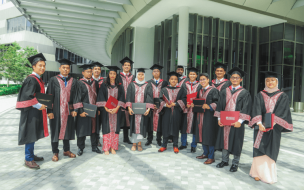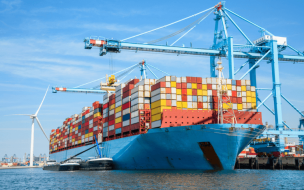At the heart of the ASEAN region is Malaysia, a thriving country which saw $2.8billion of foreign investment in 2016. Its capital, Kuala Lumpur, is expected to account for 40% of Malaysia’s Gross National Income by 2020.
Asia School of Business (ASB), located in Kuala Lumpur, is actively preparing graduates to take advantage of this growth by working in emerging markets in the ASEAN region and around the world.
Here are five reasons why you should do your MBA at Asia School of Business in Southeast Asia:
1. Location
“Kuala Lumpur is really awesome because it’s centrally located,” explains Natalie Ho, a recent MBA graduate at Asia School of Business. “It’s a hub for airlines so it’s super easy to go from country to country both in Southeast Asia and also in Asia generally.”
Asia School of Business boasts a central location in the city of Kuala Lumpur, only a half-hour train journey from Kuala Lumpur International Airport.
As well as offering students the chance to explore the region in their free-time, MBAs at ASB will visit several Asian cities during their MBA on Action Learning projects—and Natalie says that those experiences only enriched her MBA.
“Most of my projects were in Malaysia, but I also had one in Manila in the Philippines,” adds Natalie. “I had other classmates go to Bangkok, Jakarta, Vietnam, Myanmar.
“Because it’s so easy to get from place to place, we could just leave, explore somewhere else, and come back to class on Monday. It was awesome.”
2. Cost
While MBA programs in the US can often be difficult for students from developing countries to afford, pursuing an MBA in Malaysia means you’ll get the same experience and theoretical knowledge without breaking the bank.
Tuition fees for the MBA at Asia School of Business total $91,000 for international students for the 20-month program, which includes expenses for Action Learning travel, as well as industry treks to the United States and China and a four-week MIT Sloan immersion program in Cambridge, Massachusetts.
As Natalie explains, this made all the difference when deciding where she wanted to do her MBA.
“I actually applied to five programs in the US,” Natalie remarks. “Current students and alumni at US schools would tell me, ‘The biggest thing you’re going to have to do when prepping for your MBA in the US is figuring out how to save’.”
“An American graduate education, it’s really cost prohibitive. For the MBA at Asia School of Business, the tuition is still lower than a lot of Western business schools, and as part of it we get to go abroad.”
3. Diversity
Professor Loredana Padurean, associate dean of ASB and faculty director of Action Learning, says that ASB reflects the global vision of Malaysia and Asia as a whole.
“Asia is not just for Asians—Asia is an opportunity for a global population,” she says. “Asia is the fastest growing region in the world and Malaysia as a country has a strong role in the region—we see the need for a more sophisticated leadership role.”
Of the 47 students who started the MBA in September 2018, 64% came from outside Malaysia, including Mexico, South Africa, Morocco, and Kenya.
“I was actually surprised by the amount of diversity, even in the first class,” recalls Natalie. “To have the opportunity to interact with my peers and learn what their lives are like and also the chance to explore the diversity of Southeast Asia was amazing—seeing the blending of different cultures was really cool.”
4. Job opportunities
“Malaysia is a very dynamic market,” says Loredana. “There’s a lot of growth happening, both on an entrepreneurship level and in very large corporations.”
The growth of business in emerging industries such as tech in the country is unparalleled. Research conducted by The Fletcher School at Tufts University, shows Malaysia’s rate of digital evolution to be one of the fastest in the world, second only to China.
“If MBAs are trying to be more forward-looking, and thinking about where the next big thing is happening, I would argue Asia, especially Southeast Asia,” Natalie says.
During ASB's 20-month MBA program, students will have the chance to complete five Action Learning Projects in Asia, putting them in contact with companies across the region and honing their business skills to prepare for their future careers.
5. Startup scene
It’s not only multinational corporations that are flocking to Southeast Asia—the startup scene in the region is also blossoming. The recent digital growth in ASEAN has created six unicorns, or startups valued at over $1billion.
At ASB, the focus is firmly on these emerging markets, with the school making sure it fosters entrepreneurial skills within its MBAs.
“The MBA at Asia School of Business is a great opportunity for someone who needs to become market-ready faster,” says Loredana. “In traditional MBA programs, the grads are theoretically very strong, but they don’t necessarily have a very strong practical application of this knowledge.”
Natalie has seen this first-hand during her time in the MBA program.
“I think that’s really one of ASB’s strengths—its links to entrepreneurship,” she says. “In Kuala Lumpur, they’ve got all kinds of conferences going on, and it’s so close to Singapore, which is really focused now on cryptocurrency and fintech.
“Southeast Asia is definitely the place for startups—people here are super entrepreneurial. For people who are looking for a challenge, for something exciting, this is definitely the program for them!”








